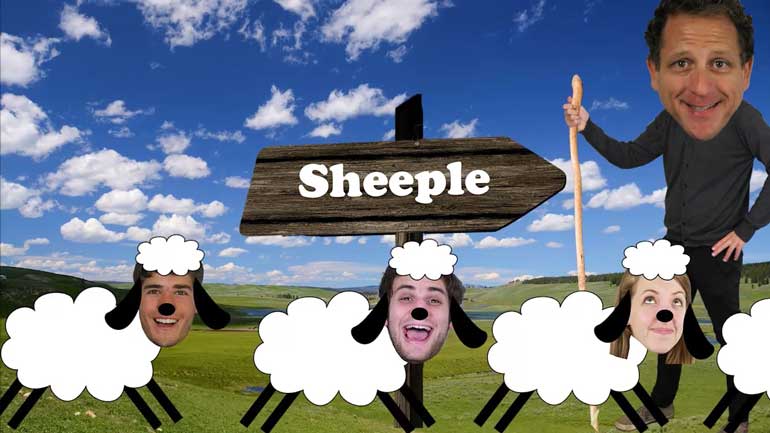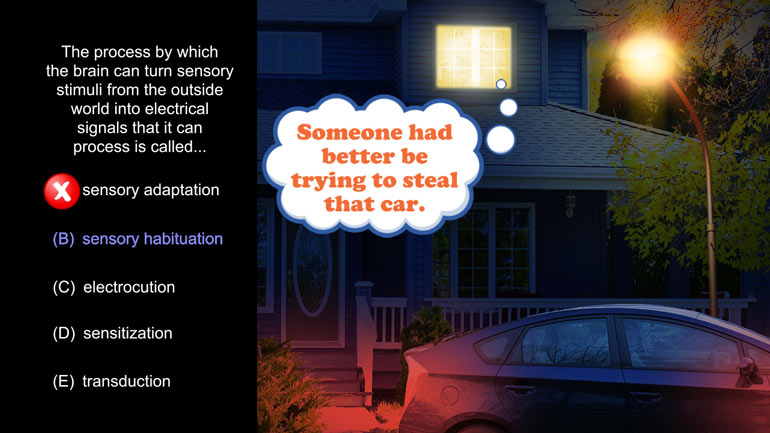ShmoopTube
Where Monty Python meets your 10th grade teacher.
Search Thousands of Shmoop Videos
AP Psychology 2.3 Social Psychology 33 Views
Share It!
Description:
AP Psychology 2.3 Social Psychology. What has Isabel engaged in?
Transcript
- 00:04
Here's your shmoop du jour brought to you by pony boy
- 00:06
most people think of the cool greaser who stays gold the hideously deformed [A half boy, half pony hit in the face with a shoe]
- 00:11
half pony half boy never gets any love. Here's the question Isabel walks into
- 00:18
school and sees pony boy and his other greaser friends on the other side of the
- 00:21
preppy socials, she has engaged in what and here the potential answers....... alright
Full Transcript
- 00:30
well no, the answer the question isn't that Isabel is about to engage in [movie lights shining on a 50's school musical]
- 00:34
spontaneous group sing along about the woes of teenage romance instead the
- 00:38
answer has to do with two distinct groups of her peers that she's noticed. The
- 00:42
greasers and the preps, but what do we call this grouping it's not called [The greasers and preps outside a school building]
- 00:46
bystander intervention which is a strategy for encouraging bystanders to [Boys picking on a boy on the school bus]
- 00:50
prevent violent acts like bullying and sexual assault but assuming those
- 00:54
greasers stay in check we won't be needing any of that. Social philosophy
- 00:58
has little to do with what we're talking about either as it's simply the study of [Boy studying social behaviour]
- 01:02
social behavior with an emphasis on ethical values so while it might help us
- 01:06
ask why the greasers feel the need to constantly wedgie the nerd, it won't [Greaser giving a nerd a wedgie]
- 01:10
help us with this question. Prototyping is sort of similar to what we're
- 01:15
describing but not quite it's when you choose the best example of something in [Woman on a beach thinking of ice cream and a fan]
- 01:19
order to enhance memory if you consider your prototype or prototypical hair
- 01:23
styles to be a pompadour for instance then you could compare all other hair [man thinking about a pompadour hairstyle]
- 01:27
styles to it for reference useful but not our answer archetyping is even closer as
- 01:33
it's a term created by young to describe universal characters or archetypes that
- 01:37
we're all familiar with you know like the crazy uncle who always talks
- 01:41
backwards but while it includes archetypes like the wise old man and the [Wise old man and the trickster]
- 01:45
trickster it doesn't include the polo wearing prep and the tough greaser, what
- 01:51
Isabel is actually engaged in is social categorization which is the organization
- 01:56
of people into social groups based on schemas that in the mind. These schemas [groups of people categorized by different colors]
- 02:01
serve as a form of organization that defines common characteristics of the
- 02:05
group allowing us to make quick judgments which can sometimes be wrong
- 02:09
and lead to stereotyping but sometimes assumptions [man sitting in a field meditating]
- 02:12
might be absolutely correct like when you assume the greasers will definitely
- 02:16
be the ones to light their hair on fire that's one nasty grease fire [greaser lighting hair on fire and man uses fire extinguisher]
Up Next
AP Psychology 2.2 Social Psychology. Which of the following was an independent variable manipulated in Asch's research?
Related Videos
AP Psychology 1.1 Personality. According to Freud, these three parts of personality are constantly in conflict.
AP Psychology 1.1 Sensation and Perception. The process by which the brain can turn sensory stimuli from the outside world into electrical signals...
AP Psychology 1.1 Social Psychology. Which of the following best describes social psychology?
AP Psychology 1.1 States of Consciousness. Who conducted research on REM sleep deprivations?




